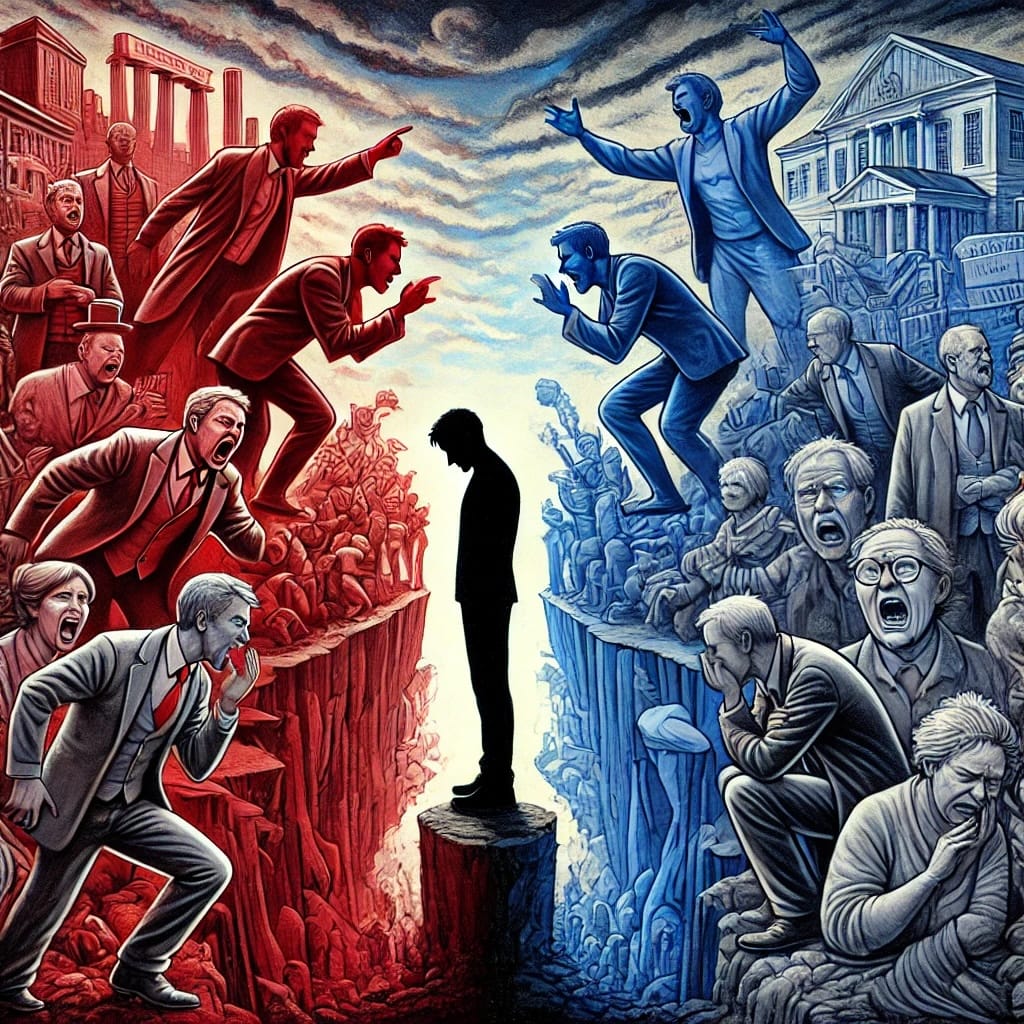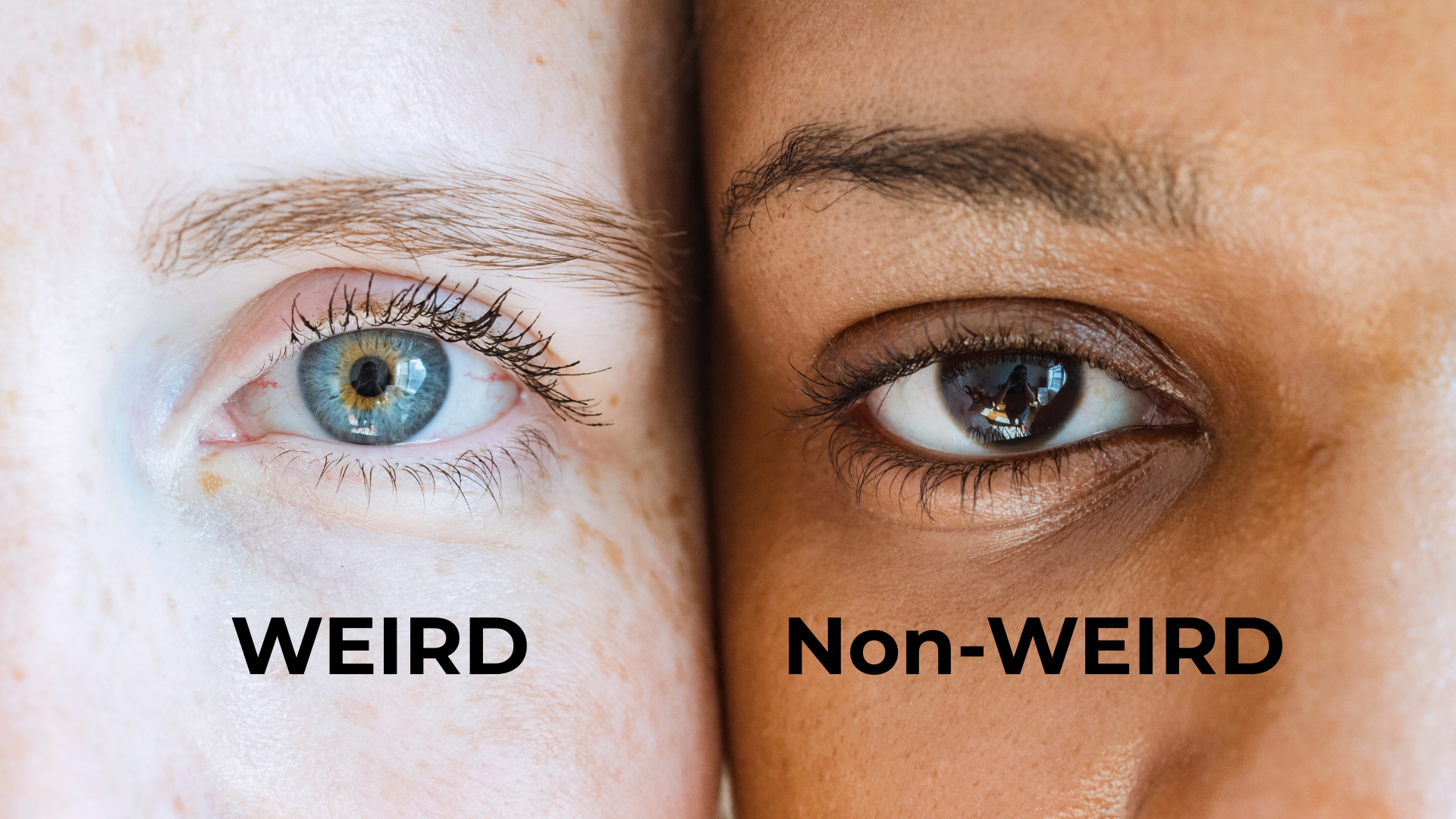As an expert in mental health, I've witnessed an alarming transformation in our democratic landscape. What used to be considered healthy political discourse has now devolved into something far more concerning: a deep-seated anxiety that's reshaping how citizens engage with democracy itself.
In my research spanning multiple Western democracies, I've observed how political polarisation has transcended mere disagreement to become what scholars term "pernicious polarisation" - a fundamental division of society into mutually distrustful camps that actively damages democratic functioning [🔗]. This phenomenon extends beyond policy disagreements into a psychological chasm where opposing sides view each other not as legitimate political adversaries, but as existential threats to their way of life [🔗].
The numbers tell a stark story. In 2024, approximately 70% of American adults consider their nation's future a significant source of stress, with this anxiety transcending political affiliations - affecting 76% of Democrats, 67% of Republicans, and 64% of Independents [🔗]. This isn't merely election-season jitters; it represents a persistent state of psychological distress that affects daily functioning. This shift has occurred despite Americans showing broad support for middle-ground compromises on even contentious issues like reproductive rights and gun safety.
The Mechanics of Modern Political Division
The transformation of political discourse from healthy debate to toxic division represents one of the most significant challenges facing modern democracies. Through my research, I've documented how this shift manifests in increasingly concerning ways.
In Western democracies, particularly the United States, political polarisation has evolved beyond simple policy disagreements into what political scientists call "affective polarisation" - where citizens view opposing political groups not just as wrong, but as fundamentally threatening to their way of life. Recent polling indicates that 81% of Americans view supporters of the opposing party as a "clear and present danger" to democracy itself.
The impact of this polarisation extends far beyond the political sphere. Through my professional experiences, I've observed a growing number of individuals whose anxiety is rooted in political issues. Recent national surveys indicate that nearly half of U.S. adults identify politics as a major source of stress, with adverse effects such as sleep disturbances, increased irritability, and intrusive thoughts [🔗]. Daily diary studies further demonstrate that political events can have a negative impact on self-reported emotional reactivity and physical health [🔗]. Furthermore, a Pew poll conducted in February 2024 revealed that 65% of U.S. adults frequently experienced exhaustion due to politics, with an additional 55% expressing anger in response to political events [🔗].
The Echo Chamber Effect
Perhaps most concerning is how modern social media ecosystems reinforce these divisions. Social media platforms, designed to maximise engagement, create what I term "anxiety acceleration chambers". These digital spaces amplify existing beliefs while systematically excluding contradicting viewpoints. Recent analysis shows that content promoting political outrage receives more engagement than moderate viewpoints, creating a self-reinforcing cycle of polarisation [🔗].
Traditional media hasn't escaped this trend either. Cable news networks have experienced a significant increase in polarisation and heightened emotional content, particularly following the 2016 election, as networks have shifted further toward their respective ideological extremes [🔗]. A Cornell University study in 2024 revealed that partisan news broadcasts have grown more emotional, with anger emerging as a dominant theme [🔗]. Notably, anger was identified as the prevailing tone in 27 out of 30 prime time news segments on Fox News. These studies collectively confirm that the cable news environment has become markedly angrier, both in terms of intensity and frequency, when compared to traditional news coverage [🔗].
Understanding Modern Voter Anxiety
Political anxiety has evolved into a distinct psychological phenomenon, separate from general anxiety disorders, as it centers on collective futures and societal stability rather than personal circumstances. The exposure to political conflict triggers specific stress responses that make individuals more susceptible to polarising messages, creating a self-reinforcing "anxiety-polarisation cycle". This psychological impact manifests in unique patterns that directly affect social relationships, cognitive processing, and emotional wellbeing.
Neurobiological evidence supports the profound impact of political anxiety on human psychology. Recent neuroimaging studies demonstrate that political threats activate the same brain regions as physical dangers, with the amygdala showing increased activity when core beliefs are challenged [🔗]. This biological response explains the intense physiological reactions to political disagreements, including elevated heart rates and increased cortisol levels. The scope of this phenomenon is substantial, with 72% of Americans reporting political stress in 2024 [🔗]. These individuals experience persistent worry about political outcomes, physical stress symptoms during political discussions, avoidance behaviours, sleep disruptions during election periods, and difficulty maintaining relationships across political divides. The pervasive nature of these symptoms suggests that political anxiety has become a significant public health concern requiring targeted intervention strategies.
The Polarisation-Anxiety Connection
The relationship between political polarisation and anxiety operates as a self-reinforcing cycle. Through my research, I've identified several key mechanisms that drive this connection:
Cognitive Mechanisms
Political anxiety triggers distinct neurological responses that affect information processing in the brain, specifically activating the amygdala and reducing activity in the prefrontal cortex, which is responsible for rational decision-making. This heightened emotional state causes individuals to process political information through an anxiety-filtered lens, leading them to overestimate threats and undervalue opposing viewpoints, while simultaneously strengthening their attachment to familiar political positions regardless of their factual merit.
The impact of political anxiety extends beyond mere emotional discomfort, creating a self-reinforcing cycle where anxious individuals actively seek out information that validates their existing beliefs while simultaneously developing stronger defensive reactions to contradictory evidence. This phenomenon, known as "motivated reasoning", becomes particularly pronounced during periods of political uncertainty or social upheaval, when people's need for cognitive stability and emotional reassurance drives them to embrace increasingly polarised positions, even when doing so requires dismissing factual information that challenges their established worldview.
Social Identity Threat
Political affiliations have become core components of personal identity, making political disagreements feel like personal attacks. This phenomenon, which I term "identity-based political anxiety", creates a defensive posture that makes bridging political divides increasingly difficult. Recent data shows that 72% of voters feel their personal values are under attack in our current culture [🔗].
Social identity threat in political contexts triggers powerful psychological defense mechanisms, as individuals perceive challenges to their political beliefs as direct threats to their core identity and self-worth. When people strongly identify with a political group, they experience heightened emotional responses and engage in motivated reasoning, systematically filtering information to protect their group identity while dismissing contradictory evidence, regardless of its credibility or accuracy [🔗, 🔗].
This defensive posture creates a self-reinforcing cycle where those experiencing political identity threat become increasingly isolated within their ideological groups, leading to deteriorating mental wellbeing and heightened sociopolitical stress. Research shows that marginalised groups and those most invested in political activism often experience the most severe forms of this stress, which can manifest in decreased psychological wellbeing and increased anxiety about political engagement [🔗]. The phenomenon is particularly pronounced during electoral periods and contentious political events, where the perceived stakes for one's identity group feel especially high [🔗].
Information Overload and Cognitive Fatigue
The overwhelming volume of political information in today's digital landscape creates significant cognitive strain, as social media algorithms promote controversial and emotionally charged content over factual information. This information overload leads to decreased cognitive capacity and impaired judgment, causing many individuals to experience decision paralysis and heightened anxiety when processing political content [🔗]. The phenomenon is exacerbated by social media fatigue, which diminishes users' ability to carefully filter and evaluate information, making them more susceptible to misinformation and emotional manipulation [🔗].
This cognitive burden manifests in a self-reinforcing cycle where exhausted individuals either engage in news avoidance or resort to simplified information processing strategies. Research shows that when people reach their cognitive limits, they become less systematic in their information processing and more likely to rely on emotional reasoning rather than careful deliberation [🔗]. This is particularly evident in social media environments, where users experiencing information fatigue are more likely to believe and share misinformation, especially those with lower cognitive ability or higher levels of narcissistic traits [🔗, 🔗].
Uncertainty and Fear of the "Other"
The transformation of political differences into perceived moral and existential threats has created a profound psychological divide in society, where individuals increasingly view those with opposing political views not just as disagreeing parties, but as fundamentally threatening "others". This phenomenon of political othering triggers deep-seated tribal instincts, causing people to process political information through an emotionally charged lens that amplifies perceived threats and diminishes the ability to recognise shared human experiences or values across political lines [🔗, 🔗]. This "othering" process creates deep-seated anxiety that extends beyond political contexts into daily social interactions. Recent data shows that 77% of respondents report a preference for avoiding political debates at work [🔗], while 49% have stated that they find it harder to be friends with those affiliated with a different political party than their own in 2024 [🔗].
The psychological impact of this othering process extends far beyond political discourse, creating a toxic cycle where fear and distrust permeate everyday social interactions. As political identities become more central to personal identity, individuals increasingly engage in self-segregation, avoiding contact with those of different political beliefs and creating echo chambers that further reinforce their perceptions of the "other" as malicious or morally corrupt [🔗, 🔗]. This behavioural pattern leads to deteriorating mental health outcomes, damaged relationships, and reduced intellectual diversity in social and professional settings, ultimately harming both individual wellbeing and broader societal cohesion [🔗].
This "othering" process creates deep-seated anxiety that extends beyond political contexts into daily social interactions. Recent data shows that 77% of respondents report a preference for avoiding political debates at work [🔗], while 49% have stated that they find it harder to be friends with those affiliated with a different political party than their own in 2024 [🔗].
Key Drivers of Polarisation-Induced Anxiety
The modern media landscape serves as a primary catalyst for political anxiety through its adoption of crisis-driven narratives. Cable news networks have dramatically increased both the frequency and intensity of hostile political coverage, with anger-driven content becoming increasingly prevalent compared to traditional news reporting approaches [🔗]. This shift toward sensationalised coverage transforms routine political developments into perceived catastrophes, heightening viewer anxiety and undermining balanced discourse.
Social media platforms amplify these tensions through algorithmic systems that prioritise engagement over social cohesion. Content that triggers outrage consistently generates higher engagement metrics than moderate viewpoints, creating a perverse financial incentive for platforms to promote divisive content. This "polarisation profit model" has become deeply embedded in digital media ecosystems, where controversy and conflict drive revenue streams.
The relationship between economic instability and political anxiety creates a particularly toxic feedback loop. When voters experience financial insecurity, their political anxiety intensifies, affecting both their political engagement and economic decision-making patterns. This phenomenon becomes especially evident in market behaviour, where research shows that investors' ideological alignments significantly influence their capital allocation decisions during politically charged periods [🔗]. The resulting market volatility further compounds anxiety levels among an already stressed electorate.
The Social Division Factor
The geographic manifestation of political polarisation has reached unprecedented levels, with Americans increasingly clustering into ideologically homogeneous communities at rates not seen since the Civil War era. This self-sorting phenomenon is particularly pronounced among millennials, where one-third cite political considerations as highly influential in their housing decisions, creating distinct urban-rural divides that reinforce existing political echo chambers and deepen partisan antipathies [🔗, 🔗]. I have found that approximately 25% of Americans factor in political alignment when deciding on a place of residence [🔗] and around 17% have contemplated relocation due to a perceived misalignment of their political views with the prevailing sentiments in their local area [🔗].
While this political migration pattern is reshaping America's electoral landscape, it's not primarily driven by intentional partisan sorting but rather by broader demographic and socioeconomic factors that correlate with political preferences. The trend is especially visible in population density patterns, where Democrats gravitate toward denser urban areas while Republicans tend to prefer less populated regions, creating a self-reinforcing cycle that amplifies geographic polarisation and makes cross-partisan dialogue increasingly rare [🔗, 🔗]. This spatial segregation has profound implications for democratic discourse, as reduced exposure to diverse political viewpoints strengthens existing biases and makes bridging ideological divides progressively more challenging.
Impact on Democratic Processes
The consequences of this polarisation-induced anxiety extend far beyond individual psychological distress. Through my research, I've documented how anxiety affects democratic participation in profound ways:
Voter Participation and Decision Quality
Political anxiety creates paradoxical effects on voter engagement. While some citizens respond with heightened participation - what I call "anxiety-driven activism", others withdraw completely. Recent data indicates that over 40% of Americans exhibit symptoms of anxiety or depression, with many attributing their heightened anxiety to the extensive coverage of the election in news and social media [🔗]. This prevalence of anxiety is often characterised by increased stress levels, concerns about significant issues, uncertainty regarding election outcomes, and strong emotional responses to political events.
The quality of democratic discourse has also suffered. This is especially true for the U.S. where the state of democratic discourse has reached a concerning low point, as evidenced by overwhelming negative sentiment toward politics among the population [🔗]. A striking 65% of Americans report feeling exhausted by politics, while 55% feel angry, with only 10% feeling hopeful and a mere 4% feeling excited. The deterioration of political dialogue is further highlighted by 84% of adults saying political debate has become less respectful, and 78% believing it has become less fact-based over recent years. This toxic environment has made political discussions increasingly difficult, with 61% of Americans finding conversations with those they disagree with to be stressful and frustrating rather than informative. The problem is particularly acute among the most politically engaged citizens, who paradoxically experience the highest levels of exhaustion and anger, suggesting that greater involvement in democratic processes currently correlates with increased negative emotional experiences.
Trust in Democratic Institutions
Recent polling data reveals a significant decline in public trust in democratic institutions. Only 20% of Americans feel "very confident" in the integrity of the U.S. election system, while 56% have "little or no confidence" that elections represent the will of the people [🔗]. This erosion of trust has created a concerning cycle - as confidence decreases, political anxiety increases. A 2024 NPR survey found that 64% of Americans believe U.S. democracy is in crisis and at risk of failing, with over 70% saying democracy is more at risk now than a year ago [🔗]. The situation has become so severe that 76% of Americans now view internal political instability as a greater threat than external adversaries [🔗].
This decline in institutional trust has particularly intensified during times of crisis. Research during the COVID-19 pandemic showed that negative perceptions of crisis management led to decreased political trust, especially among government supporters who became disillusioned with institutional responses [🔗]. The erosion of trust has been further exacerbated by widespread misinformation, with studies showing that the persistent retelling of false election claims continues to undermine confidence in the voting process [🔗]. This creates what researchers observe as a self-reinforcing cycle where decreased trust leads to increased anxiety, which in turn further erodes confidence in democratic institutions.
Vulnerable Demographics
The impact of political anxiety isn't distributed evenly across society. My research has identified several groups that experience disproportionate effects:
Political anxiety manifests uniquely across different social groups, with certain demographics experiencing heightened vulnerability to its effects. Generation Z and younger millennials show particularly concerning patterns, with 76% reporting feeling overwhelmed by political information. This demographic faces a perfect storm of stressors: constant social media exposure, economic uncertainty, and existential concerns about climate change all compound their political anxiety.
Minority communities experience what can be termed "compounded political vulnerability", where political anxiety intersects with existing social stressors. During election periods, 83% of minority voters report heightened anxiety levels, while simultaneously showing significantly lower trust in democratic institutions. Their political participation often carries additional psychological burdens, as community-specific concerns amplify general political tensions.
Swing voters and political moderates, traditionally viewed as democracy's stabilising force, face unique psychological challenges in today's polarised landscape. These individuals often experience "political homelessness syndrome" - a distinct form of anxiety stemming from feeling unrepresented in increasingly extreme political discourse. They demonstrate increased decision paralysis when evaluating political choices and face greater social isolation due to their moderate positions. The pressure from both political extremes creates heightened stress about "choosing wrong", making their role as bridge-builders increasingly challenging.
Coping Mechanisms and Solutions
Drawing from both research and applied experience, I've identified several effective approaches to managing political anxiety while maintaining democratic engagement:
Individual strategies for managing political anxiety have shown remarkable effectiveness when combining psychological techniques with practical boundaries. Structured "political news breaks" demonstrate a 43% reduction in anxiety levels, while mindfulness practices specifically adapted for political stress help maintain emotional equilibrium. Digital wellness strategies, including content filtering and designated offline periods, provide essential boundaries in our lonely but hyperconnected world. These personal interventions work best when supported by social networks that encourage cross-partisan dialogue and understanding.
Community-level initiatives have emerged as powerful tools for reducing political tension and building social resilience. Neighbourhood democracy projects have decreased reported stress levels by 37%, while cross-partisan community service programs create meaningful connections across political divides. Local issue forums that focus on shared concerns rather than party politics have proven particularly effective at fostering constructive dialogue and reducing anxiety. These community approaches are complemented by institutional reforms, particularly in media literacy education. Comprehensive programs show a 67% improvement in disinformation resilience, with the Finnish model of media literacy education standing out as an exemplar. When combined with digital citizenship curriculum and cross-partisan dialogue training for community leaders, these institutional changes create a robust framework for managing political anxiety while maintaining democratic engagement.
Future Implications
The intersection of technology and political discourse presents both promising solutions and concerning challenges for managing political anxiety. AI-driven fact-checking systems are demonstrating effectiveness in combating misinformation, while virtual reality platforms create novel opportunities for cross-partisan dialogue in controlled, constructive environments. Blockchain technology offers potential solutions for enhancing electoral transparency and rebuilding trust in democratic processes. However, these technological advances come with significant risks, as 73% of democracy experts express concern about AI's potential to exacerbate political divisions through increasingly sophisticated manipulation techniques.
The long-term effects of sustained political anxiety on democratic systems reveal troubling patterns that demand attention. Geographic sorting along political lines continues to accelerate, creating ideological enclaves that further reinforce existing divisions. Generational gaps in democratic participation are widening, though new forms of civic engagement are emerging that adapt to high-anxiety environments. These evolving patterns suggest a critical need for proactive measures to strengthen democratic resilience while addressing the underlying causes of political anxiety. The challenge lies in harnessing technological innovations to support democratic processes while mitigating their potential to deepen existing social and political divides.
Conclusion: Charting a Path Forward
The escalating crisis of political anxiety and polarisation demands immediate, multi-level intervention to preserve both democratic functionality and public mental health. Three critical areas require urgent attention to strengthen democratic resilience: enhanced transparency in political processes, reformed campaign finance systems, and improved voter education initiatives. Supporting individual and community wellbeing must focus on accessible mental health resources specifically designed for political anxiety, alongside community-based support networks that bridge political divides. Technology must be leveraged responsibly through advanced content moderation systems, AI-powered fact-checking capabilities, and improved platforms for civil dialogue.
Sustainable solutions require fundamental systemic changes that address the root causes of political anxiety. Electoral system reforms must reduce zero-sum thinking, while media ecosystem improvements should prioritise accurate information over engagement metrics. Educational curricula need updating to enhance civic literacy and critical thinking, supported by cultural shifts that promote civil discourse and cross-partisan understanding. The stakes couldn't be higher - our ability to maintain functional democracies while protecting citizens' mental health will define the coming decades of political discourse and civic life. Political anxiety represents not merely a personal psychological challenge but a collective threat to democratic functionality that requires coordinated action among stakeholders, from politicians and media organisations to technology companies and mental health professionals. The research points to promising solutions; the challenge now lies in finding the collective will to implement them.













Discussion